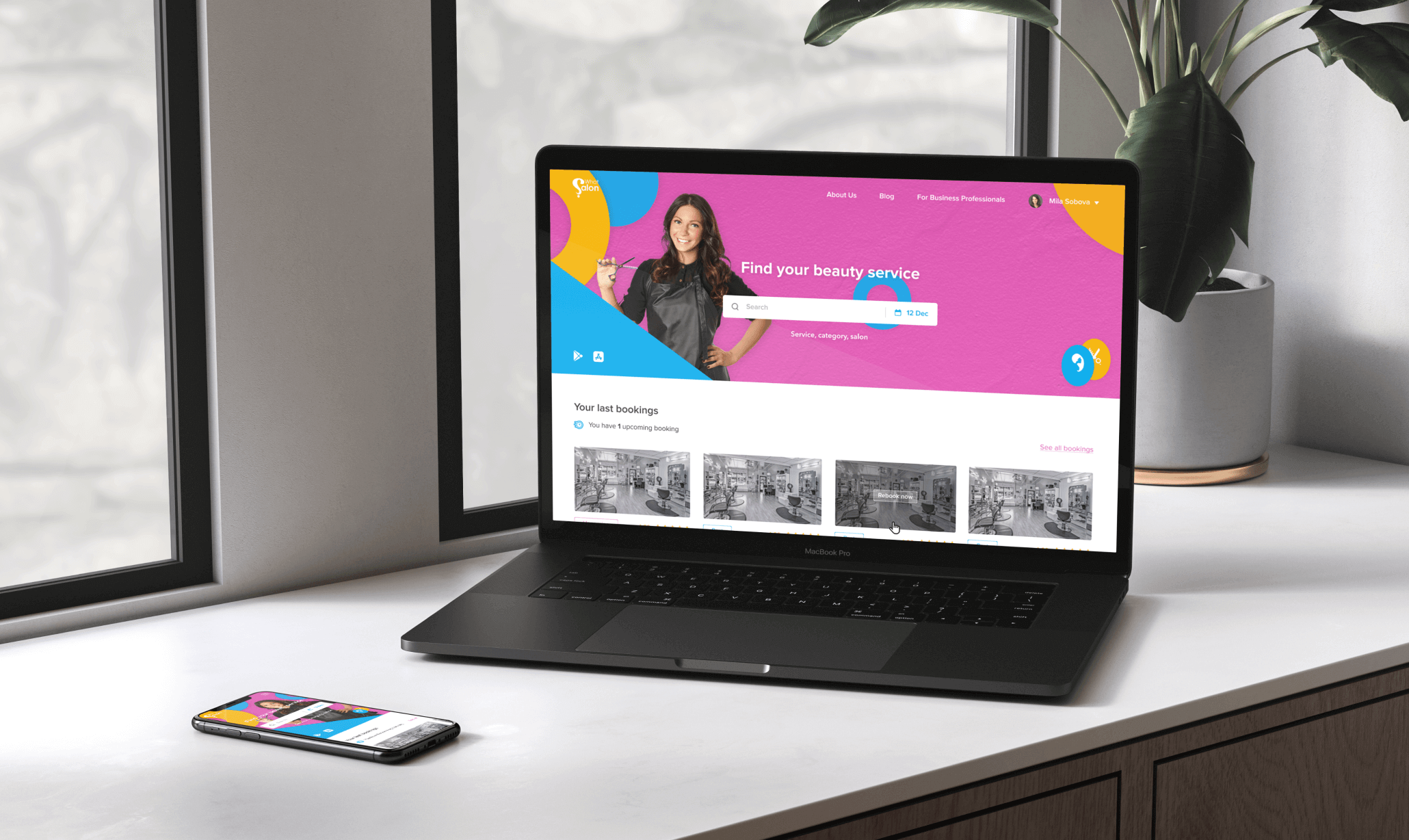От халепа... Ця сторінка ще не має українського перекладу, але ми вже над цим працюємо!

Salon management software: how to add some tech to non-tech business

Volodymyr Khmil
/
CEO
6 min read
Content:
- What makes a salon competitive in 2022?
- Salon management software: seeing the bigger picture
- Integrating a beauty salon CRM system: what’s inside?
- Building a booking app for a beauty salon: points to consider
- What Salon development case: a marketplace and CRM with appointment features for beauty salons
- Conclusion

Beauty salons are one of the most popular businesses around the world. Some reports show that the number of hair salons in the US alone is almost one million. Increasingly empowered by technology, the industry continues to evolve.
Every business owner wants to improve their services as much as possible and attract more customers. That’s why beauty startups are thriving so much now: they pair up with beauty salons, help them grow, and streamline their revenue.
In this article, we define trends in the beauty salon market in 2022, look behind the scenes at salon management software, and see how a customer relationship management (CRM) system can benefit you. As always, we can’t help but share a successful development case. We’ll review the case of WhatSalon, a beauty salon marketplace CRM system.
See also: Making the right choice: 12 things to know about prebuilt and custom eCommerce platforms
What makes a salon competitive in 2022?
Beauty is a huge and ever-evolving industry, with new trends emerging every year. This means that to keep up with demand and remain competitive, it’s essential to embrace the latest technologies. How far you go depends only on your current needs and budget.
So what does the market want from beauty salons in 2022?
Strong online visibility. You must do your best to ensure customers can find the salon they need. This can require a complex approach involving a mobile-friendly website, pinning beauty spots in Google maps, and publishing relevant content on your website to take advantage of SEO best practices.
Tech-savvy salon management software (with CRM integration). Your management team needs an efficient system to process client information and handle appointments. We recommend using software built specifically for this purpose. Salon management software (SMS) allows your team to add new clients on a dashboard; send invoices; organize events, coupons, and discounts; and track client history through CRM integration.
A customer-centric booking system. Start with a detailed description of all services and products the salon provides. Make it easy for clients to book appointments depending on their needs, location, and preferred time slots. Ensure no-stress rescheduling and cancellation options. The more flexibility you add, the smoother the customer experience.
Omnichannel communication. Customers increasingly expect a seamless and consistent customer experience across all touchpoints. If a customer wants to get in touch with a salon, they expect to do it the way they want and exactly when they want, without searching for contact info. That’s why you should offer communication channels at every point of the customer journey, from social media to a chatbot for 24/7 support.
A sound reputation. A good reputation is a key to every successful business. In the era of influencers and social media, this is truer than ever. Happy customers will tell others about the salon they visited; if they have a bad experience, they will tell others even more than happy ones. To ensure the feedback from visitors is shared across all possible sources, provide customers with tools for feedback and reviews so that anyone who’s ever visited a salon can share their opinion of it.
Moreover, we suggest you elaborate on the system of reactions to negative reviews (from obligatory responses to flexible compensation plans) to reduce their effect because there’s nothing worse than a negative review left with no answer.
See also: How much does it cost to create an app? [7 calculation formulas with examples]
Salon management software: Seeing the big picture
Salon management software provides a complete solution for the in-house and customer-centric interactions of beauty parlors.
Let’s review salon management software’s main features.
- Online scheduling lets clients book appointments from their desktop or mobile device, offering multiple communication methods (chat, email, etc.).
- Automated appointment reminders notify clients of their appointments via text and email so that they can quickly reschedule or cancel if needed, which reduces no-shows.
- Employee management systems (EMS) control staffing levels by scheduling appointments according to staff availability and assigning tasks based on skill level and experience.
- Inventory management keeps track of all inventory items such as hair products, nail polish, and skincare products. This way, salon staff know when to restock a particular product to avoid running out of stock and missing out on sales opportunities.
- Reporting dashboards let managers see key performance indicators without accessing confidential client information.
- Customer loyalty programs generate discounts and special deals for visitors based on how much they spend, leading to higher retention rates.
- Point-of-sale (POS) terminals process sales, manage payments, store customer data, and provide analytics about sales.
The CRM system: what’s inside?
Due to its importance, a beauty salon CRM system deserves its own section in our article. Hardly any service provider with more than a few customers can exist without a CRM system. What kind of software is this, and what does it do?
Customer relationship management (CRM) software is an on-purpose software for beauty salons (and other customer-oriented) businesses that helps them manage their day-to-day operations. It keeps track of customers, schedules appointments tracks inventory and sales, and performs many other functions, all in one place.
Let’s look at some essential features of a beauty salon CRM system:
Customer management. This feature lets you create a profile for each customer. It typically includes personal details, such as name, age, address, and purchase history. Entering information like a new client’s email address and phone number into the system is helpful later when you want to send promotional emails or newsletters. You can access the record to avoid repeatedly typing contact info.
Sales tracking. Tracking sales figures daily, weekly, monthly, or yearly is another critical function of CRM software. It lets you see how much the salon earned from various products and services provided during any time period, which helps you make improvements and set targets for the future.
Online appointments. A modern beauty salon CRM system can create an online appointment calendar where clients can book specific time slots. This is especially useful if you run a busy salon with many customers daily.

Building a booking app for a beauty salon: points to consider
An online booking app is a way to go if you’re looking for a way to streamline your startup platform and make it easy for clients to book appointments instantly.
However, before looking for a software development vendor for mobile app development, you should answer these questions:
- What are the essential features you need from a CRM system?
- Who is the target audience?
- When do you want to launch it?
- What are your budget and timeline considerations?
- What features do you need in the app?
- How will it operate across different platforms and user devices?
Once you’ve answered these questions, you’re ready to start looking for a software development company specializing in creating online booking apps. Start by finding vendors who’ve already built CRM solutions and check their relevant expertise and what recognition they’ve received. Our guide on the team extension model describes the process of choosing a software development company.
See also: Software development pricing models
Development case: The WhatSalon marketplace and CRM with appointment features for beauty salons
WhatSalon is a platform that helps salons run and manage their business. It consists of two products. First is a marketplace where customers can find beauty salons and book visits based on geolocation data and other preferences, and the salons can promote and sell their services. Second is a CRM system for salons to handle their business and data.
The client came to NERDZ LAB with a partially existing iOS and web app they wanted to finish.
The CRM part was built from scratch as one dashboard portal to manage beauty salon businesses.
For the marketplace, we discarded the previous solution and completely rebuilt it to create a convenient middle ground for salon seekers and beauty parlors, with marketing tools for salon promotion.
The client received two reliable solutions from the collaboration:
- A CRM with the following features:
- Beauty salon registration
- Dashboard
- Client database and data tracking
- Reporting tools
- POS terminal
2. A centralized marketplace for beauty salons and clients who seek their services, with the following key elements:
- Advertising and marketing tools for beauty salons
- An online booking system with an interactive calendar for service seekers
- A catalog with available beauty service providers to search by geolocation, available timeslots, prices, and reviews
- API integration of the six biggest CRM software providers
- Payment system

You can review the entire development process and results here.





